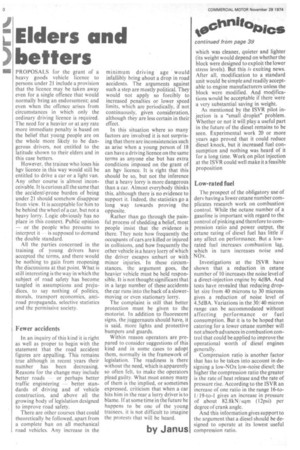Elders and betters
Page 42

If you've noticed an error in this article please click here to report it so we can fix it.
PROPOSALS for the grant of a heavy goods vehicle licence to persons under 21 include a provision that the licence may be taken away even for a single offence that would normally bring an endorsement; and even when the offence arises from circumstances in which only the ordinary driving licence is required. The need for a heavier or at any rate more immediate penalty is based on the belief that young people are on the whole more likely to be dangerous drivers, not entitled to the latitude shown to their elders and in this case betters.
However, the trainee who loses his hgv licence in this way would still be entitled to drive a car or a light van. Any other course is almost inconceivable. It is curious all the same that the accidenf-prone burden of being under 21 should somehow disappear from view. It is acceptable for him to be behind the wheel of a car, but not a heavy lorry. Logic obviously has no place in this context. Public opinion — or the people who presume to interpret it is supposed to demand the double standard.
All the parties concerned in the training of young drivers have accepted the terms, and there would be nothing to gain from reopening the discussions at that point What is still interesting is the way in which the subject of road safety has become tangled in assumptions and prejudices, to say nothing of politics, morals, transport economics, antiroad propaganda, selective statistics and the permissive society.
Fewer accidents
In an inquiry of this kind it is right as well as proper to begin with the statement that the road accident figures are appalling. This remains true although in recent years their number has been decreasing. Reasons for the change may include better roads or perhaps better traffic engineering better stan dards of driving and of vehicle construction, and above all the growing body of legislation designed to improve road safety.
There are other courses that could theoretically be followed, apart from a complete ban on all mechanical road vehicles. Any increase in the minimum driving age would infallibly bring about a drop in road accidents. The arguments against such a step are mostly political. They would not apply so forcibly to increased penalties or lower speed limits, which are periodically, if not continuously, given consideration, although they are less certain in their effect.
In this situation where so many factors are involved it is not surprising that there are inconsistencies such as arise when a young person of 18 can have a driving licence on the same terms as anyone else but has extra conditions imposed on the grant of an hgv licence. It is right that this should be so, but not the inference that a heavy lorry is more dangerous than a car. Almost everybody thinks this, although there is no evidence to support it. Indeed, the statistics go a long way towards proving the opposite.
Rather than go through the painful process of shedding a belief, most people insist that the evidence is there. They note how frequently the occupants of cars are killed or injured in collisions, and how frequently the other vehicle is a heavy lorry of which the driver escapes unhurt or with minor injuries. In these circumstances, the argument goes, the heavier vehicle must be held responsible. it is not thought significant that in a large number of these accidents the car runs into the back of a slowermoving or even stationary lorry.
The complaint is still that better protection must be given to the motorist. In addition to fluorescent signs, the juggernauts should have, it is said, more lights and protective bumpers and guards.
Within reason operators are prepared to consider suggestions of this kind and in some cases to adopt them, normally in the framework of legislation. The readiness is there without the need, which is apparently so often felt, to make the operators plead guilty. What must annoy many of them is the implied, or sometimes expressed, criticism that when a car hits him in the rear a lorry driver is to blame. If at some time in the future he happens to be one of the young trainees, it is not difficult to imagine the protests that will be heard.
by Janus




























































































